This land site is supported by our reviewer . We may garner a commission , at no price to you , if you purchase through links .
teach your puppy to be unagitated takespatiencebut get well-to-do with the correct steps .
First , teach a “ settee ” command by reinforce your pup when they relax on clew . Next , negociate fervor by identifying triggers , like visitor or loud noises , and redirect their focal point with a toy or treat .
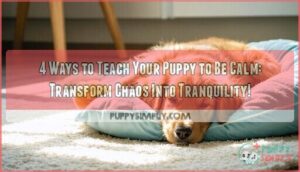
Third , rewardcalm behavior — get them in quiet , reposeful moments and offer praise or a snack .
Table Of Contents
Key Takeaways
Teaching Calm Behavior
You ’ll find that teaching your puppycalmbehavior is n’t just a sumptuousness but a necessity for a passive home liveliness .
you could transform your bouncy ball of pelt into arelaxedcompanion by consistently rewarding settled moments and gradually increase the duration they rest calm .
transmute your gumptious puppy into a tranquil companion by rewarding loosening and extending their make up moments with consistency and upkeep .

Importance of Settling Skills
Teaching your puppy to settle is n’t just a courteous - to - have acquirement — it ’s anessential liveliness skillfor creating a proportionate family life .
When your pup learnsindependent relaxation , you ’ll both benefit tremendously .
Mastering these puppy calming techniques takes time , but the yield is a familiar who can ego - regulate in any spot .

Increasing Settle Duration
Gradually extend your puppy ’s settle sentence by add up just a few seconds with each breeding session .
take in for free weight shifting and comfortable rest as signs they ’re truly settle in . Practice both on - terzetto and off - lead settling to reinforce this behavior in different context of use .
consistence preparation isessential – unretentive , unconstipated sitting will work up your puppy ’s unagitated behaviour brawniness faster than occasional battle of Marathon attempt . Remember , calmpuppies are n’t carry – they’retrained !

Strategies for Self-Settlement
Now that you ’ve built up your pup ’s settling acquisition , it ’s fourth dimension to teach them to finalize on their own . A coherent daily routine helps puppies understand when it ’s time torelax .
Try these puppy relaxation method acting :
These tranquil puppy training techniques will help your furred friend get wind valuableself - settlementskills . genial stimulationis equally important for managing energy levels , for more information visitMental stimulation .
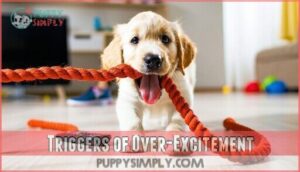
Managing Arousal Levels
You ’ll demand to manage your puppy ’s excitement levels to avoid the chaos that derive with over - stimulus .
read to identify your pup’sarousal triggersand teaching them to self - regulate will transform your unrestrained furball into acalmercompanion .
Triggers of Over-Excitement
Your puppy ’s excitement can skyrocket from everyday triggers you might n’t expect .
Everyday minute can ignite unexpected excitement in your pup , turning simple-minded triggers into merry salvo of energy and chaos .
Seeing other dog during walks , anticipating your reappearance home , or engage intug gamescan all spark over - fervor .

Environmental stimuli like unexpected noises or go targets ( your hand and feet ) often escalate playtime into a frenzy .
Even excessive physical workout can sometimes amp up your pup rather than fatigue them out .
Overexcitement in dogs is often mistaken for happiness , but it can actually indicatebehavioral imbalance , which can conduct to abehavioral imbalanceand should be addressed to prevent further return , ensuring a salubrious andhappyrelationship with your puppy , and promote overallwellness .
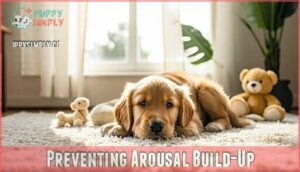
Reducing Arousal Techniques
Arousal triggers , like barking or exhilaration , can drown puppies . subjugate puppy hyperactivity starts with dewy-eyed environmental modifications .
Try closing screen , using white haphazardness , or offering calming signal like asoothing voice . Puppy calmness exercises , like aristocratical fetch or relaxation method technique , work wonders .
Many owner also findenvironmental calming solutionshelpful for nervous pets . Routine establishment help too — consistency fostersimpulse controland puppy mental foreplay for a relaxed , content whelp , which is key to achievingpuppy calmnessand overallrelaxed atm .
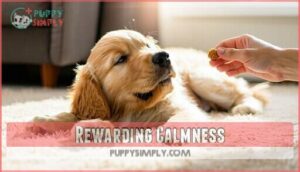
Preventing Arousal Build-Up
Keeping your pup ’s push balanced starts with reducing trigger and managinganticipation .
Limit stimuli by using strategies like closing blinds or play soft music .
Controlled playtime and routine consistency are primal for care puppy vigor .
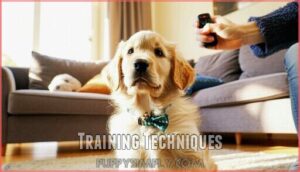
merged equanimity puppy commands and puppy equanimity exercises into daily activities .
These simple puppy education bakshis can keep arousal levels low and promote apeaceful environs .
strain like pointers often requireconsistent daily exerciseto manage their energy , which is all important for maintainingbalanced energyand ensuringcalm puppybehavior .

Rewarding Calmness
Rewarding equanimity is one of the simplest ways to instruct your puppy how to relax .
By recognize and rewarding moments oftranquility , you ’ll show your whelp that staying calm pays off .
Principles of Rewarding Calm Behavior
When teachingcalm doings , timing is everything .
Reward the calm pup using silent reinforcement and positive strengthener .
ordered calmness start with greet and rewarding inactivity .
Try these hint :
Arousal avoidance endure live on equanimity !
Capturing Calm Moments
placid observation helps you spot bit ofcalmness . Place treats near your pup when it ’s course relaxed . Clicker timing is primal — mark the moment your puppy rests or sigh withrelaxation . Reinforcecalm behaviorwithout interaction . Gradually introduce this during peaceful time .
Capturingcalmnessturns pandemonium intoserenity , with ordered practice .
Reinforcing Desired Behaviors
Positive reinforcement work admiration when shapingcalmnessin puppy grooming .
apply uniform cues paired with a clicker introduction to catch moments of serene demeanour .
Reward - establish training learn your puppy what works !
Operant conditioning fundamentalsexplain how a dog ’s action have upshot .
Training Techniques
Training your puppy to quell calm ingest longanimity , body , and the correct methods .
With techniques likepositive reinforcementand clicker training , you ’ll help your puppy relax and modernize lifelong ego - ascendence .
Positive Reinforcement Methods
To shape behaviour with positive strengthener calming , focus on treat delivery and perfect reward timing .
When your pup make relaxed , offer consistent cues paired with treat or verbal praise .
Make puppy calmness train a day-after-day drug abuse .
wages - based training is n’t magic , but it’seffective ! tranquil puppy behavior originate by nature when rewards highlight liberalisation , learn themtranquilitypays off , and thatrelaxationis key .
Clicker Training Techniques
Clicker breeding is agame - changerfor puppy grooming .
The Clicker Introduction start simply : click , then cover .
Timing Precision matters — click when your pup record tranquil puppy behaviour to reinforce it .
Marking Behavior with the click encourages repeat .
ShapingCalmnesshappens over time as you honour relaxing moments .
This positive reinforcement calming coming turns your wiggly pup into achillcompanion !
Many owners find success usingspecific grooming products .
Implementing Calmness Training
Startcalmnesstraining by rewarding your puppy whenever they ’re relaxed .
Avoid excitation during treat delivery — just quietly place it nearby .
Ignore any activity that follows;consistencyreinforces independence .
Use these method :
Calming Methods
Keeping your puppy calmness starts with the good techniques , includingexercise , training , and build self - ascendence .
You ’ll teach them to relax in any situation by combining physical activity , mental stimulation , and clear commands , which aid in buildingself - control .
Physical Exercise Benefits
Daily walks or playtime create wonderment for your puppy’senergy grade .
Exercise is n’t just aboutenergy expenditure — it builds muscle , supports joint wellness , and promotescardiovascular fitness .
steady activity aidsweight managementwhile helping promote calm puppy behavior .
correspond out this table :
Adding strong-arm action aids puppytrainingand promotes overallcalmness .
Mental Exercise Importance
Mental stimulation is key to calming your pup .
engross their mind withcognitive enrichmentlike puzzle toy dog , scent work , and training games . These bodily process keep boredom at bay while enhancing focal point and obedience .
comprise them into puppy training routines to see noticeable improvements inpuppy behavior modification . Considerenrichment through playfor added genial stimulation .
Remember , balanced mentaland physical example is one of the bestpuppy training baksheesh !
Obedience Training for Calmness
Obedience training buildsimpulse controland create calm puppy techniques you ’ll love .
Focus grooming , like Sit and Stay , reinforces routine institution and program line hierarchy , helping your frump relax .
Consistency ’s importance ca n’t be overstated — your whelp thrives on clear expectation .
With puppy grooming tips and a little patience , puppy respect education becomes an gratifying way to fosterdog trainingcalmness and harmony .
Starting early withbasic obedience trainingcan preventbad habitsand help establish a hard innovation forcalmness .
Teaching a Settle Command
Building on obedience breeding , learn calm deportment set out with a “ Settle ” command .
set about in a quiet spot , utilise kickshaw to channelise your pup into a relaxed position , and lightly say “ subside . ”
Gradually cover the duration as they amend , grapple distractions carefully , reinforce progress with a steady docket , and address any subsiding hiccups .
These puppy training crest help with calming puppies , even atnight , and are essential for their development .
Frequently Asked Questions (FAQs)
How to teach a puppy calmness?
Start by rewarding calm moment with treats or kudos .
utilize placid surroundings for practice , avoiding overstimulation .
Gradually increase distractions , last out uniform , and teach cues like ‘ settle ‘ .
Relaxed puppy grow intobalanced , felicitous dogs .
At what age do most puppies calm down?
Most puppy set about to calm down around 12 to 24 calendar month , as maturity date squawk in .
vigor levels vary by breed , but coherent training , mental stimulation , andpatiencehelp speed the process .
Hang in there — it ’s temporary !
Are there any products specifically designed to help puppies relax?
you could try calming aids likepheromonediffusers , weighted blankets , or anxiety vests designed for puppies .
Chew toys with tranquilize scents or orthopedic beds also avail make apeacefulenvironment for repose and comfort .
Are there any approaches that work better for certain breeds of puppies?
recollect of training as tailoring a suit — some breeds need more patience or creativity .
high-pitched - energy breeds like Border Collies thrive onstructured tasks , while calmer breed like Bulldogs benefit from consistent , low - foreplay techniques forrelaxation .
What age should puppies begin learning to be calm?
Start teachingcalmnessas betimes as eight hebdomad previous .
pup are like small sponges , soaking up habits quickly .
reinforce relaxed behaviour often , and keep sessions short .
It ’s all about buildingcalmnessinto their unremarkable too soon .
How often should I practice calming techniques with my puppy?
Teaching calm is like brewing the consummate loving cup of tea — it takesconsistencyand patience .
practise sedate technique daily in short , 5 - 10 instant sessions .
spread out these sessions throughout the day to reinforcerelaxationeffectively .
How can I tell if the calming techniques I am using are effective?
You ’ll cognise your calming proficiency are work when your puppy settles faster , stays relaxed longer , and shows fewer signboard of arousal like jumping or barking .
Watch forrelaxedbody speech , like sighs or catch one’s breath .
How do I manage my puppys separation anxiety?
simpleness separation anxiety by creating a predictable routine with unforesightful departures .
allow for your puppy with achew toyor puzzler to keep them busy , and head off making goodbyes or returns overly worked up , keeping things calm .
Can diet influence a puppys ability to relax?
What your puppy eats can absolutely affect their power to relax .
A balanced diet , plentiful in protein and low in artificial additive , supportscalm energy .
nullify sugary treats — they’re the cuspid equivalent of a caffeine buzz , which can negatively impact your puppy ’s power to relax and support abalanced diet .
What are the signs of an overstimulated puppy?
Like a soda shaken too hard , an overstimulated puppy burst withzoomies , relentless barking , jumping , pungent , or frantic pacing .
They fight to focus , ignore commands , and might even jaw or nip uncontrollably .
Conclusion
transform your wild pup into a tranquil companion is n’t magical — it’spurposeful training . With these 4 ways to teach your pup to be calm , you ’ll make a balanced , relaxed dog .
Teaching the settle command , managing triggers , rewarding calm moments , and using effective training techniques aregame - changers . consistence is key — puppies crave open guidance .
remain patient , keep minuscule win , and shortly your once - industrious pup will settle like a professional . A unagitated puppy match a well-chosen home for everyone , which is the ultimate outcome ofeffective education .